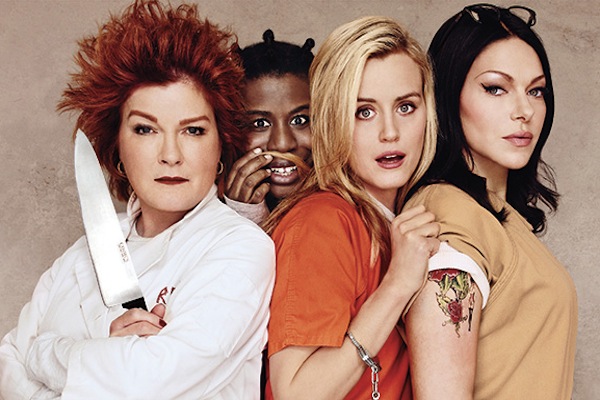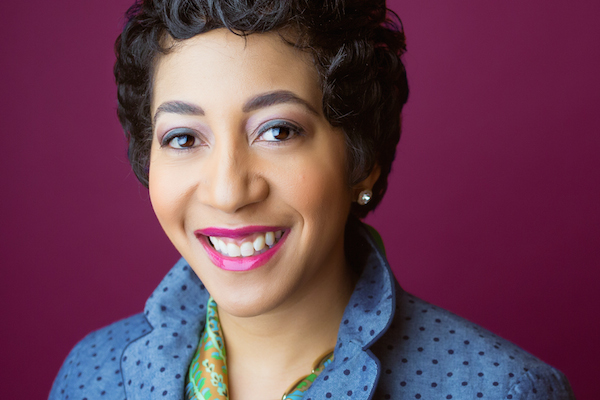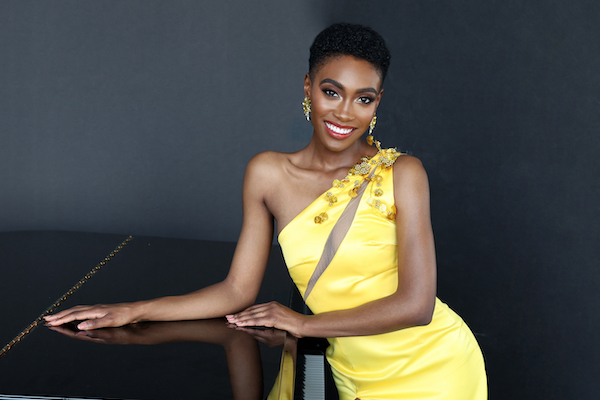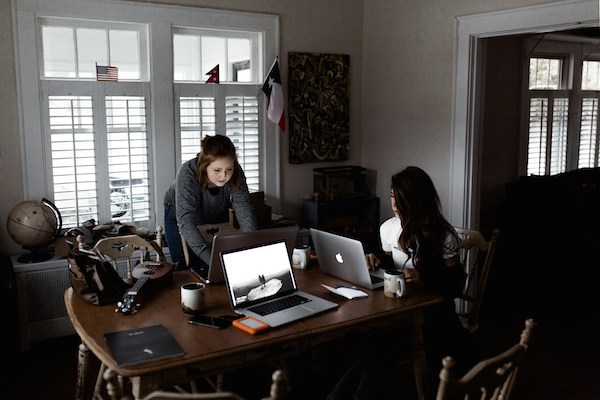
Louisiana High School Changes Mind on Lesbian Student Wearing a Tux to Prom
April 7, 2015
Everything’s Coming Up Orange…in June
April 10, 2015An interview with Aisha Moodie-Mills on politics, race, and the LGBTQ movement
Highly esteemed and long-time policy analyst and political strategist Aisha Moodie-Mills was recently announced as the next President and CEO of the Gay & Lesbian Victory Fund. For the past 15 years, Moodie-Mills has been building her political capital. She has served as a political advisor, private sector liaison, and fundraiser to more than 50 members of Congress. As President of Synergy Strategy Group, she was instrumental in raising millions of dollars and helping to expand the political reach of several liberal candidates and advocacy organizations.
She has been named “Forty under 40” by the Advocate and featured in The Root’s “100 Emerging and Established African-American Leaders.”
As a rising star, most people would agree that her new position comes at an important time. The Victory Fund’s sole purpose is to create a pipeline of out LGBTQ elected officials that will serve to change the face of American politics as it relates to LGBTQ rights and equality. This changing of the guards comes on the heels of a significant shift in focus; to raise up voices that forge equality movements in the most marginalized of LGBTQ communities.
We sat down with Moodie-Mills for a one-on-one interview to ask about her plans, anticipated wins and even address the recent Religious Freedom Restoration Act (RFRA) catastrophe.
There was a recent shift at the Victory Fund to focus their attention on the most marginalized of communities, and to choose you, someone who has built her career on giving voice and face and representation to those communities was perfect. Tell me about the moment when you were offered the job.
I went into the final interview knowing that I would take the position if they offered it to me. I dont know who else was in the running, but I was not that surprised because of exactly the point you made. It just feels very serendipitous that my career over the last 13 years, led me to a place where I am perfectly suited for this work with the Victory Fund and their strategic plan. I have spent the last four years of my career talking about LGBTQ people of color and what I call the new American majority; bringing them into the public, political, and national discourse. It has been great for me to take particularly black LGBTQ people and bring our issues, ideas and interests into the forefront of the national political arena.I have worked very hard to create big change in the way we think about the LGBTQ community. It was meaningful for me to align with an organization that values people of color and trans people as part of the core strategic mission. I clearly knew this was the move for me to make.
With the merging of your experience and the shift in focus of the Victory Fund, what do you envision your biggest challenges and wins will be as you move the organization forward?
My biggest challenge is going to be fundraising and really growing the organization back to its peak. When we had someone shiny and dynamic like Senator Tammy Baldwin at the top of the ticket, fundraising was easier. In the next couple of cycles, we may or may not have someone that shiny at the top of the ticket. I still have to raise a lot of money in order to do the work in the city council races in Mississippi, Indiana, Oklahoma, and places where we don’t have LGBTQ equality.
I really want to broaden the definition of winning for the LGBTQ community. I come to Victory really thinking about the LGBTQ movement as a civil rights movement. What we know is that no one has won their civil rights in America. That is why we are still fighting for civil rights. The community itself has focused so much on marriage equality, as if it were to be the destination of the movement. We know that is not the case. We can not think that the anticipated SCOTUS is the destination. It is just a part of the path.
Through my work at Victory, I want folks to realize that winning is actually going to be about the amount of political power we can a mast. We a mast political power in the LGBTQ community when we elect LGBTQ people to office up and down the board. Winning is also investing in our pipeline. If 20 years from now, we have an arm of talent that we have trained and gotten elected, that is what winning looks like. Winning is something we need to constantly work at.
Just leaving the Center for American Progress, what will you take with you as you move into your new role?
The number one thing I will take with me is that big and bold ideas have the power to change the world. Everything begins with a big bold idea. Big bold ideas are potentially transformative. Yet, they only matter if you communicate those ideas with people and take those ideas to the streets, to the tweets and to the people who can actually touch and feel them. People can then use those ideas to change their own lives and hold policymakers accountable for the conditions being placed on their lives. The second thing I will take with me is that how we tell our stories is also transformative. How we tell our stories and the fact that we do tell our stories, is what changes hearts and minds and moves people to engage politically and otherwise.
Can you tell us what your first month might look like as you take on your new position?
Former President, Chuck Wolfe, unfortunately has had some significant health issues and has been on medical leave and there have been some interim Directors. What often happens when an organization doesn’t have steadiness at the top is that there is a lot of transition and holding of breath. What I’m hoping to do is to provide some clear cut leadership and stability to the organization from a fundraising, messaging, communication and from a broader morale standpoint.
There are so many amazing people who are invested in Victory. We have a large campaign board of folks from all around the country who help us determine what candidates to endorse and fundraise for. We also have a significant board of directors and so many constituencies around the country who care very deeply about the work that we do. It is time to get them jazzed up and excited again. Its time to really show that we are safe and secure in our thinking and values and are on the right track, Its time to really get them fired up. That is what I’m really going to be focused on. Reigniting all of the energy and passion that have been waiting until there was some stability.
You fought so hard for the right to marry here in D.C. and many of us around the country have enjoyed the benefits of those who have fought for that right. However, with the impending SCOTUS decision leaning to rule on full marriage equality, it seems the surge of RFRA bills and laws is our next fight. What are The Victory Fund’s plan to impact the explosion of these LGBTQ right to discriminate bills masked as RFRA, around the country?
I don’t have the long-term answer for this because I have not technically started, but here is what we do know. We know that there is an absolute correlation between having out LGBTQ elected officials, LGBTQ inclusive policies and particularly non-discrimination policies. The opposite is also true. What we have always done is get LGBTQ people elected to office. We pipeline elected officials. We do that because we know that if we are not at the table then we are on the menu. When we have LGBTQ people sitting in those legislatures, it is less likely that really horrific anti-lgbtq policy will just ease through the way it did in Indiana.
With regards to the election process, what can the average person do to help change the reality of RFRA laws and or legislation in their state?
All politics are local. I think that is the very beginning of everything that happens with the political process. Folks often come out and vote because its a presidential election. Everyone is excited. But what happens on the city council and state legislature most directly affect your day to day life. Not what is happening in the white house. I would love it if more people put their hat in the ring on the local level. Be the mayor of your local borough, or serve on your county commission or city council. The more people who get involved in the policy making and governing process of their own communities, the better their own communities will be. Get involved on the local level.
Who are the rising stars that the LGBTQ political community needs to look out for?
It would be so unfair to point to one or two. I’m not going to point out any early bets to hedge just yet. But I will say that I do encourage people to go and learn more about our candidates. We have some really great people running in some districts that are surprising. In places like Oklahoma, Indiana, and Colorado. Places where you don’t see a ton of out LGBTQ officials. Those are the races to watch. What will be critical and important is that in order to win, we have to drive equality where equality doesn’t currently exist. We are also, really going to be focused on having diverse candidates as well. So be in the look out for that. Check out our roster.
Your credentials are very substantial, yet all the headlines made your announcement about your gender and your race. When a man gets a new executive position, announcements always lead with his credentials, his former successes and plans for his new successes. That didn’t happen with you. How do you respond to that?
I have been a black lesbian for much of my life. This is not something that I can put into a closet or hide from. So it’s not surprising that other people recognize that too. Here’s the thing, the historic significance and legacy piece of me being appointed to this position is not lost on me and it is something significant to marvel at and mention.We know that the demographic of our country is changing. We also know that the LGBTQ community is a rainbow, even though we have not always presented ourselves through the media as such. We know those things to be true, and yet you look at the leadership across the LGBTQ community and you don’t see the diversity reflected back at you. That is problematic.
There are people who are underrepresented and there are communities who are not at the table. The transgender community in particular, obviously LGBTQ POC, as well as women have been ostracized and boxed out of a lot of mainstream LGBTQ organizations. I do what I can to make sure I lead with my credentials and I am clearly the best person for the job because of the way my résumé lines up. I also don’t want to shy away that it matters that there is now a black woman sitting at the table and making decisions. What I bring is unique because I bring a very different lens and perspective about the community to the work. I think that is power and a value add particularly as we talk about going to places where we don’t already have equality in every district.
I’m hopeful that in calling out and marveling at the fact that I happen to be a diverse person holding a job that had never been held by a diverse person, that other movement leaders really call into question, how significant their work can continue to be if they are not reflective of the constituents they serve. That matters. If someone peaks their eyebrow and has a different train of consciousness because race or gender came up, then so be it.
I love that you are talking about my credentials and that you led with those questions. So, thank you.
Is there anything else you want to share with the readers of Tagg Magazine?
I would love to emphasize that what excited me about Victory is that I am so jazzed up to be able to be in a position where I am cultivating the next generation of leadership. To me, that is so powerful and significant. In 20 years we will still have work to do and someone has to carry that mantle. So, I am jazzed up to be in a position where I get to do that and think about the long-term. There will be 500 people who come through my training in the next couple of years. They are going to be leaders in their community in some way and that is pretty exciting. If there was an LGBTQ agenda, it would be to cultivate talent to go off and to do amazing things.





